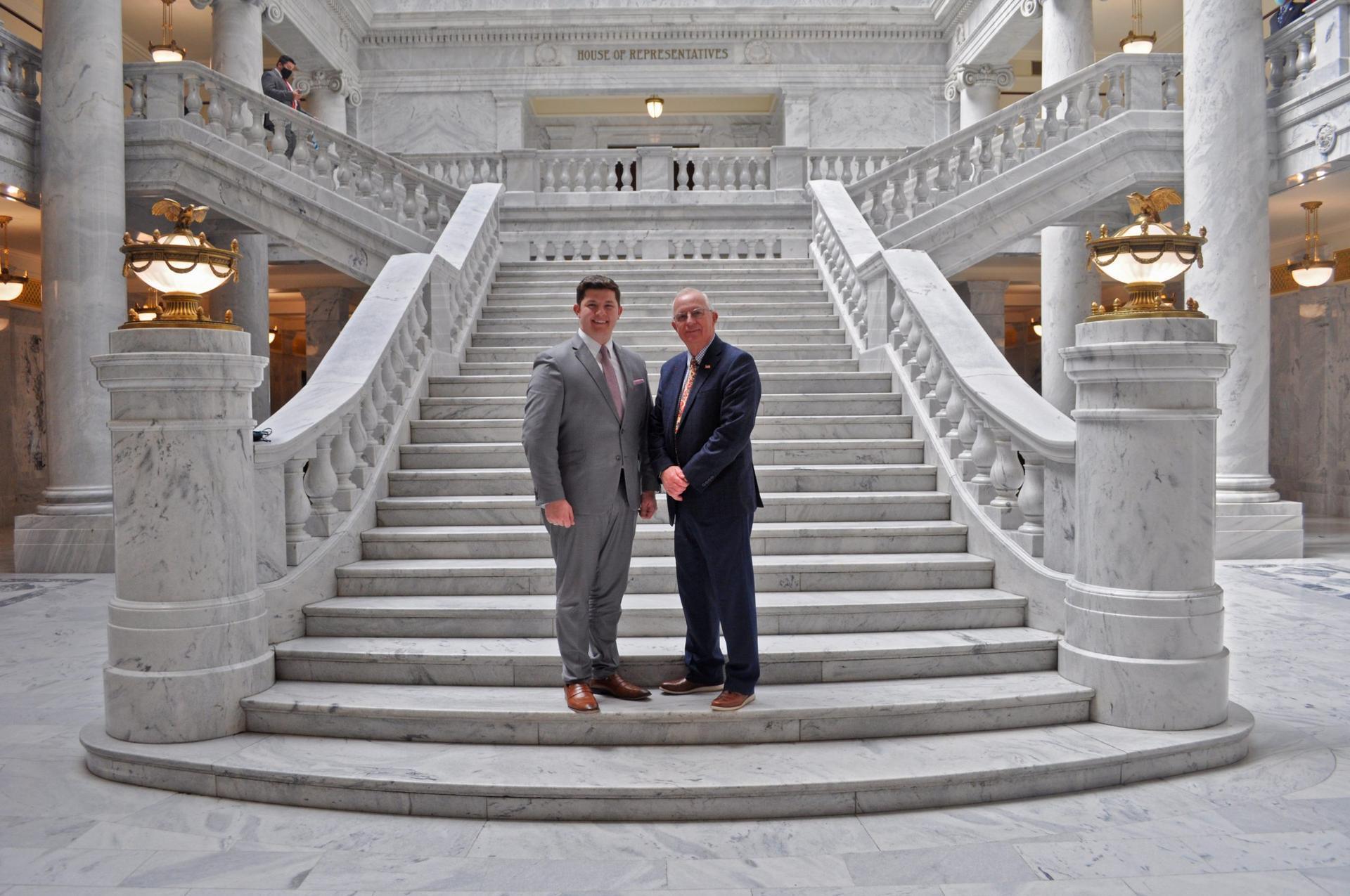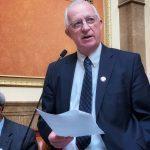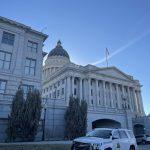By the Office of Representative Carl Albrecht, District 70
We have now officially completed the 2021 Utah Legislative Session, and what a session it has been. We started with the National Guard posted around the Capitol, experienced some big snowstorms, worked hard and have accomplished a great deal.
Utah’s Legislative period is a short 45 days (only 33 working days) and is one of the most effective Legislatures in the nation. The Utah House debates and passes many bills every Session and labors tirelessly to get everything done before returning home.
Representative Albrecht has had a very successful Session and was able to sponsor nine bills, including two Senate bills. It was very productive, and he got a lot done for rural Utah.
This week was very different and was comprised almost entirely of floor time and debate. There were only a handful of committee meetings early this week to review the remaining bills being proposed.
As we conclude the Session, I would like to provide a final review of his Legislation and the final outcome of each of Representative Albrecht’s bills. I have listed his sponsored legislation below.
House Bill 32 Energy Balancing Account Amendments was passed unanimously by the House and Senate and is awaiting the signature of Governor Cox.
House Bill 111 Off-Highway Vehicle Amendments gave permission for minors to legally operate off road vehicles (after passing a state OHV test and under adult supervision) in a state park and on public lands. It passed the House and Senate unanimously and is awaiting the signature of Governor Cox.
House Bill 180 Lieutenant Governor Conflict of Interest Amendments helps to resolve conflicts of interest that might arise when a Lieutenant Governor runs for the office of Governor. After passing the House, it was sent to the Senate where amendments were made that would give the Senate power to advise and consent on the neutral party appointed by the Governor. It was not heard the final evening of the Session on the Senate floor.
House Bill 247 Transient Room Tax Amendments was one of Representative Albrecht’s priority bills. He is incredibly proud of this legislation and what it will do for rural Utah. It will allocate more of the Transient Room Tax funds for infrastructure needs in rural Utah. It does not actually alter the tax itself, but rather changes where the funds can be used. It passed the House and Senate unanimously, before and after amendments. It is awaiting the signature of Governor Cox.
House Bill 356 Rural Economic Development Tax Increment Financing (REDTIF) works to move investment to rural Utah. It encourages Utah and non-Utah companies as well as existing companies who are looking to invest in rural Utah by providing an attractive tax incentive. The genius of this bill is that it would not only benefit rural Utah by strengthening its economy, but also serve Northern Utah by lessoning congestion and improving air quality. It passed the House with a single dissenting vote, unanimously passed its committee hearing in the Senate on Monday and passed its final votes in the Senate on Friday. It is waiting for the signature of Governor Cox.
House Bill 388 State Energy Policy Amendments was likely one of the timeliest bills of the entire Session. Its focus is on energy in Utah and helps to develop advanced energy like hydrogen. It also ensures that utilities have enough proven reserves to offset any renewable sources in case of an emergency or an extreme weather event. These power reserves are vital in ensuring that the power crisis that happened in Texas and California never happens in Utah. It passed the House unanimously and also passed through its Senate committee hearing on Tuesday with complete support. Because of its value and importance, it was put on the Consent Calendar, which allowed it to be moved directly to the Senate Third Reading Calendar. After minor amendments, it passed through the House and Senate unanimously, and is awaiting the signature of Governor Cox.
House Concurrent Resolution 12 Encouraging Cooperative Action Regarding National Monuments was sponsored by Representative Albrecht after House and Senate leadership asked him for his support to run the resolution. It asks the Biden Administration to give Utah a seat at the table and include us in federal discussions and decisions regarding the Grand Staircase – Escalante and Bears Ears National Monuments located in Utah. In recent administrations, the federal government has taken unilateral action regarding Bears Ears and Grand Staircase – Escalante. This bill helps ensure we are included in these decisions and that Utah’s needs are considered. This passed the Senate and is awaiting Governor Cox’s Signature.
Senate Bill 55 Rural Online Initiative Sunset Amendments is a Senate bill sponsored by Senator Owens. Representative Albrecht was the House sponsor. It deals with Representative Albrecht’s Rural Online Initiative program. This program is administered by Utah State University and helps people in rural locations be trained on “remote online opportunities.” It was a pilot program and was incredibly successful. Because of its impressive success, this bill removed its “pilot” status and allowed the program to continue without a sunset. It unanimously passed the House and the Senate and was signed by Governor Cox on Feb. 15. Because of his hard work, Utah State University has selected Representative Albrecht for their Friend of USU Extension award to be presented on March 19.
Senate Joint Resolution 9 on Jail Facilities was sponsored by Senator Hinkins and House sponsored by Representative Albrecht. The bill addresses jail space at the Emery County Correctional Facility. Its goal is to contract beds of state inmates in Emery County. It passed the House and the Senate unanimously and is waiting for the signature of Governor Cox.
Utah is famous for having one of the most effective part-time Legislatures in the nation. Our elected officials work diligently every Session to pass Legislation that will benefit Utah in countless ways. They also work hard to keep a balanced budget, another thing we are famous for.
Representative Albrecht works hard and is dedicated to his constituents and District 70. He is well known for his rural development bills. This year, including the Senate bills, Representative Albrecht sponsored nine bills and several appropriations requests for rural Utah. Representative Albrecht is grateful for your sustaining support and for the honor of representing Utah’s District 70 in the House of Representatives.
Representative Albrecht asked that I include the following message.
“Please call or text me at (435) 979-6578 or email me at carlalbrecht@le.utah.gov with questions or concerns. Chase Christensen has been an exemplary intern for me, and I appreciate all his hard work and dedication. Thank you, Chase, and best wishes in the future.”
Week 7 House Newsletter
Rep. Jon Hawkins
There was not a dry eye in the chamber as we said hello to Rep. Jon Hawkins. Rep. Hawkins has been in the ICU battling COVID-19 and has been unable to participate in the legislative session. Watching Rep. Hawkins cast a few votes and speak to his colleagues was the most memorable and special moment of the entire session.
100 Years of Agriculture
Last week, the Legislature passed HCR 21 recognizing the 100th anniversary of the Department of Agriculture and Food. Every living former commissioner joined us in the gallery as we read the resolution.
Executive Appropriations Committee
The Executive Appropriations Committee met on Thursday evening to finalize the budget to present to the full bodies before session ends. Additional items to the budget included caucus approved fiscal note bills and HB 433 Amendments Related to Infrastructure Funding, which provides $834,600,000 for infrastructure projects throughout the state. This is the largest single one-time investment in infrastructure and an incredible investment into Utah’s future.
Affordable Housing
This week, legislative leaders and philanthropic representatives held a press conference to announce a public-private partnership in addressing affordable housing and homelessness. To address these challenges, the Utah Legislature will use $50 million in state funds and, through the support of the philanthropic community, amplify that investment to almost three-quarters of a billion dollars in impact. Read more here.
New Utah State Parks
The Legislature passed HB 257 Utah State Park Amendments, which will create two new state parks: Utahraptor State Park and Lost Creek State Park.
Located in the Moab area, Utahraptor State Park will cover 6,500 acres with campgrounds, trails and endless outdoor recreational opportunities. The park is named after the Utah State dinosaur and is near a huge deposit of dinosaur bones.
Another new state park, Lost Creek, a 365 surface acre lake, is located in the mountains of Northern Utah and is popular for fishing, ice fishing and wakeless boating.
In addition to the state parks, the Legislature will appropriate millions of dollars to drastically assist the Division of Parks and Recreation in improving and expanding recreation access across the entire state, which will help alleviate the growing demand for outdoor recreation. The improvements will increase outdoor recreation in Utah and benefit local economies and park visitors.
The funding will add approximately 500 campsites to the state’s overall campsite inventory and expand public parking by 10%, which will add around 1,000 additional visitor parking spaces. When completed, these investments will mean we will be able to accommodate literally thousands of additional visitors each weekend at our state parks!
Policy Highlights
S.B. 195 Emergency Response Amendments (Rep. Peterson) aims to bring greater balance to power in emergency situations. It addresses limits in the length of time that health departments and the executive branch can put into place emergency mandates.
H.B. 294 Pandemic Emergency Powers Amendments (Rep. Ray) allows for the termination of emergency powers and public health emergency powers related to COVID-19 upon reaching a certain threshold of vaccination and recovery.







